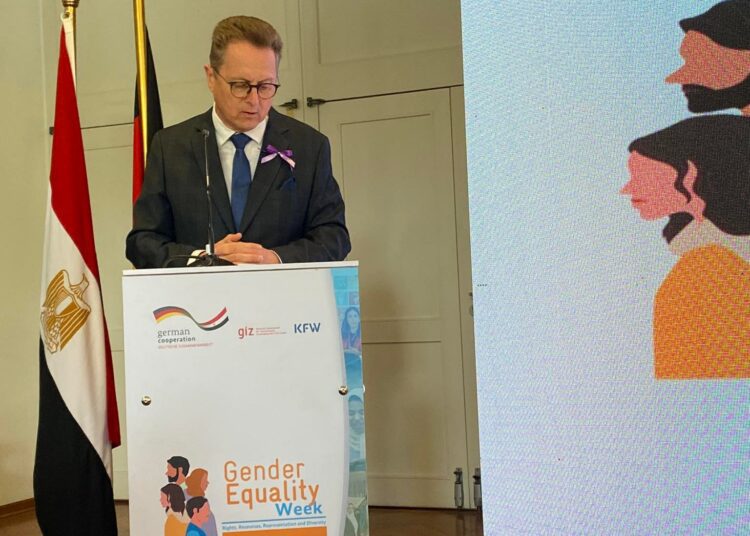The German embassy in Egypt marked the International Women’s Day to recognise the importance of women and their contributions to society, both in Egypt and internationally.
The event focused on the economic inclusion for women after multiple days of workshops and activities by different German actors in cooperation with GIZ.
“Today we are celebrating the success of flourishing startup businesses that are run by Egyptian women .The more diverse and inclusive we are, the more we can achieve together as society, a company or an embassy,” German Ambassador to Egypt Frank Hartmann said.
The German envoy pointed out that the German Foreign Minister Annalena Baerbock visited Egypt last year, and she had one message , namely: Women’s rights are human rights.
We see that women’s voices and ideas are crucial for societal stability in light of today’s complex challenges in climate, social, economic or political development, he added.
“Therefore, our policies must be driven by diverse voices from all parts of society. That’s why Germany subscribes to the Feminist Foreign Policy and to feminist development policy. “
Last week, two ministers Annalena Baerbock and Svenja Schulze published the guiding documents to explain what that means.
“Oour policy is driven by the needs and ideas of vulnerable parts of society. Germany is not alone in this strategy. France, Sweden and Canada have adopted similar strategies that apply concepts of diversity and gender equality while not naming it feminist,” the ambassador said.
Societies which work towards more peaceful, just and inclusive development are economically more successful than those that exclude women, he added.
The Feminist Foreign Policy tackles three dimensions. First, it deals with rights as Germany works together with partners like Egypt to advance women’s rights and to ensure that they are protected. This spans across all fields ranging from a right to education to rights and protection in cases of domestic violence. Concretely, Germany engages in joint activities on domestic violence in Egypt with the Embassy of France, Egyptian NGOs, UN Women, and the Parliament Committee on Human Rights.
The second dimension is representation.
“Fifty per cent of our employees in the German MFA are women, but only 27 per cent are ambassadors, although the percentage increased slightly over the last few years. We strive to ensure meaningful participation of diverse voices. This includes the political process, the private sector and civil society resources. All our project work is gender sensitive. “
In this regard, Minister Schulze declared that by 2025, more than 90 per cent of newly committed project funds from the Ministry globally are to flow into projects that contribute to gender equality. The Foreign Office dedicated 85 per cent to gender-sensitive projects and 8 per cent to gender transformative projects.
“This is a new approach, which will have an impact on our programming of development cooperation. The feminist foreign policy is a mandate for our work abroad. And it is a challenge for us internally.”






Discussion about this post